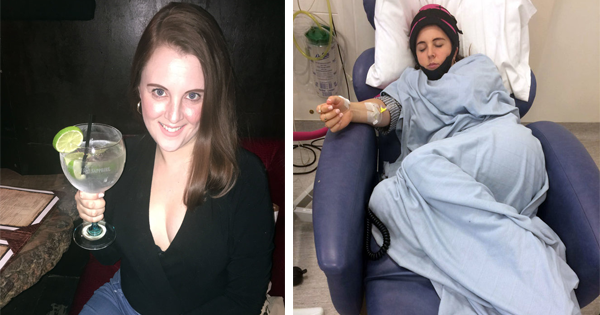Advertisement
30-year-old mother-of-two, Gemma Patten, had always been a responsible patient and went to all of her tests and screenings as her doctor advised. Just three years ago, she’d had a smear test done. The results were negative.
Earlier this year, when Patten began to experience heaving bleeding between periods, she knew immediately that she should go visit her doctor.
There, she completed a vaginal swab for STIs and a subsequent smear test, where nurses found blood and called for more tests to be done.
When Patten heard that “the doctor wanted to see [her] immediately,” she knew something was terribly wrong.
It was later that week that she received the first wave of bad news: She had abnormal cell growth, and her doctor wanted to examine her cells more closely.
“That’s when I became scared,” she recalled, “I had the symptoms and abnormal cells. I just knew it couldn’t be anything but cancer.”
At her next appointment, Patten “saw on the magnified screen what looked like a huge lump. … It looked so evil. [She] was staring at it and that’s when [she] knew for sure what it was.”
The doctor diagnosed her the following week. Patten had stage 1b1 cancer; a one-centimeter large tumor was growing on her cervix.
Rather than fear for her own life, Patten’s first thought was her children. She didn’t want to leave them behind and feared that if she left, no one would be there for them. They were her primary concern when she went to discuss treatment options with her doctors.
Although Patten’s cancer was still in its early stages, the doctors wanted to make sure to remove the cancer fully and completely through surgery. Patten could either get her entire womb remove din a hysterectomy, or have the affected third of her vagina and cervix taken out in a trachelectomy.
Patten and her partner, Joshua Archibong, wanted to keep the option of having more children open, so Patten opted for a trachelectomy.
But immediately following the successful trachelectomy procedure, Patten found herself facing another scare when cancer was discovered in her lungs.
This time, treatment wasn’t as easy. She is currently undergoing chemotherapy and will continue to do so for the following month – and she now has a far different outlook on life.
Having part of her vagina be “taken away” was already “strange” to her, but having this wake-up call immediately afterward has taught her to “live every day.”
“I now feel like I have a purpose in life, to save people,” Patten said. “Sometimes you have to fight to survive but life is so worth it. “




